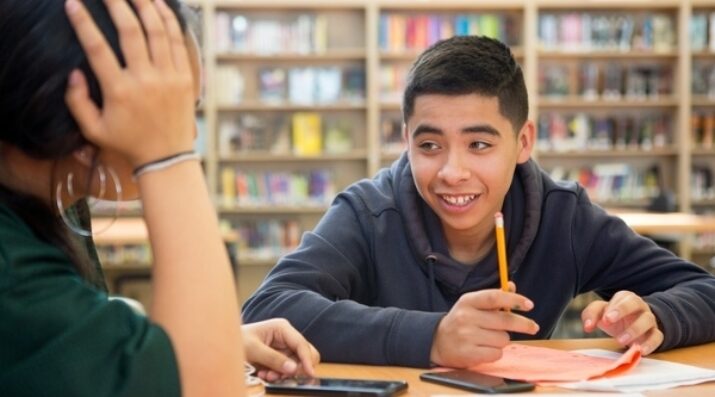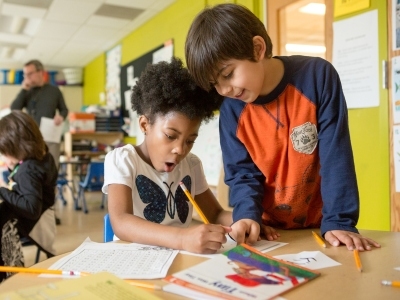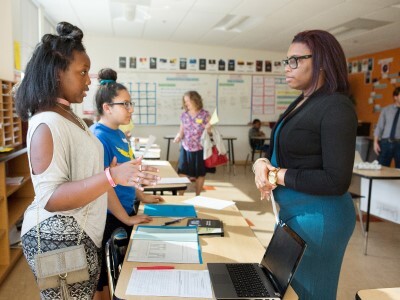Students before Content: The True Power of Relationships in the Classroom
Topics

We’ve all had the experience of truly purposeful, authentic learning and know how valuable it is. Educators are taking the best of what we know about learning, student support, effective instruction, and interpersonal skill-building to completely reimagine schools so that students experience that kind of purposeful learning all day, every day.
By treating my students with kindness and respecting their voices, I’ve seen unprecedented levels of engagement and positivity in the classroom.
Teachers often hear about the importance of developing authentic, positive relationships with kids. Many of the PDs I've attended focus on specific teaching strategies but more broadly, they all point to relationships as the end-all-be-all of successful teaching. This year, by adopting a blended, self-paced, and mastery-based classroom model (using the Modern Classroom framework), I have come to truly understand how relationships with students can be the key to their success (and my sanity) in the classroom.
Let me share a little secret: I’m getting so many holiday cards from students telling me I’m their favorite teacher. They all say something like, “You are really cool and teach us stuff that actually matters and that we can use in real life.” It’s so sweet of them. But here’s the secret part: my curriculum last year was exactly the same, and I did not get nearly as many cards. Many of the students in my Level II music class had my Level I class last year, and I did not get these cards from them. So, what gives? I didn’t change, and neither did they, and neither did my content. How did I become the favorite teacher for so many students, some of whom used to argue with me daily?
Here’s what happened: I eliminated the lecture portion of my lessons and started allowing students to follow their own pace through my units. This means that I no longer have to be a wrangler of 12-year-olds, and consequently I’m no longer the person who spends class frustrated, angry, and sometimes yelling at children to stop talking. (I used to be that person, and looking back, I see why I didn’t get as many cards). Now, after a little coaching through the routine, my students get started learning and working right away, and I am free to move from group to group, checking in, providing tips, or pushing any particular student’s understanding of the content even further. Meanwhile, the rest of the class works independently or watches video lessons I’ve recorded for them.
I’ve seen an unprecedented level of engagement with my content and a huge increase in the amount of music-making and reflective writing my students are doing on a day-to-day basis in class.
I have been genuinely surprised by how much more time I spend in deep, content-focused discussions with students, not only because I’ve regained the ten or so minutes of lecture time, but also because I spend so much less time managing behavior. In fact, even when I do find myself in discussions that aren’t about music, they’re rarely about behavior management. Just a few days ago, I spent five minutes discussing property taxes and home equity with an eighth grader (who was on pace with my classwork). Remember, I teach music, but I have other areas of expertise, and my students have other interests—we were able to explore this topic together, and he was still able to finish his music lesson and stay on pace! These little focused discussions pop up all the time in my class because students know I’ll take the time to indulge their curiosity (usually around musical topics, but not always). After all, encouraging student inquiry is a pillar of good teaching, and my students know I’ll respect their voice and their inquisitive minds even if they don’t appear to be directly engaging with content for my class.
Relationships in which each student individually feels valued and respected are astonishingly powerful. Lightheartedness and kindness don’t come at the cost of rigorous academic or behavioral expectations; in fact, if we’re authentic in the classroom and open ourselves to students, they’ll hear us as more genuine when they’re struggling and will be more receptive to our advice. One student spectacularly bombed our first unit (finishing only one of twelve lessons), but I didn’t become the angry teacher-as-boss and berate her or make her feel dumb. That would have been disingenuous because, of course, I don’t think that about her. Instead, I spoke honestly with her about her behavior and her focus (and I had the 11 missing lessons as data to back up the point that she had wasted her time). She heard and acknowledged me, and six weeks later, she finished the second unit with a B+ average! She’s kept this pace up into the third unit, and amazingly, I also heard from her advisor that I am (somehow) her favorite teacher—a student whom, last year, I would have raked over the coals, and she probably would have kept avoiding (and failing) my work out of defiance!
Some teachers can pull off the mean, strict teacher-persona while still showing kids respect and care. I’m thoroughly impressed by them because that person is not me, and I am so happy to have found that, in a lecture-free and self-paced model, I don’t have to pretend to be him anymore. I have discovered the simple but powerful trick of building relationships with students so they know that I value them. It wasn’t through slick lesson plans or activities designed to let them come up with their own answers, it was simply through opening my ears (and heart) to what they were saying, joking with them a little, and understanding that my content is not the center of their world. I’ve seen an unprecedented level of engagement with my content and a huge increase in the amount of music-making and reflective writing my students are doing on a day-to-day basis in class. They come to my class feeling positive and ready to learn, and the cards and compliments are merely icing on the cake. They are discovering that school can be fun when their teachers treat them like people, and with a mindset shift like that, they’ll begin to see themselves as—and become—the scholars we want them to be.
Photo courtesy of Allison Shelley/The Verbatim Agency for American Education: Images of Teachers and Students in Action.




